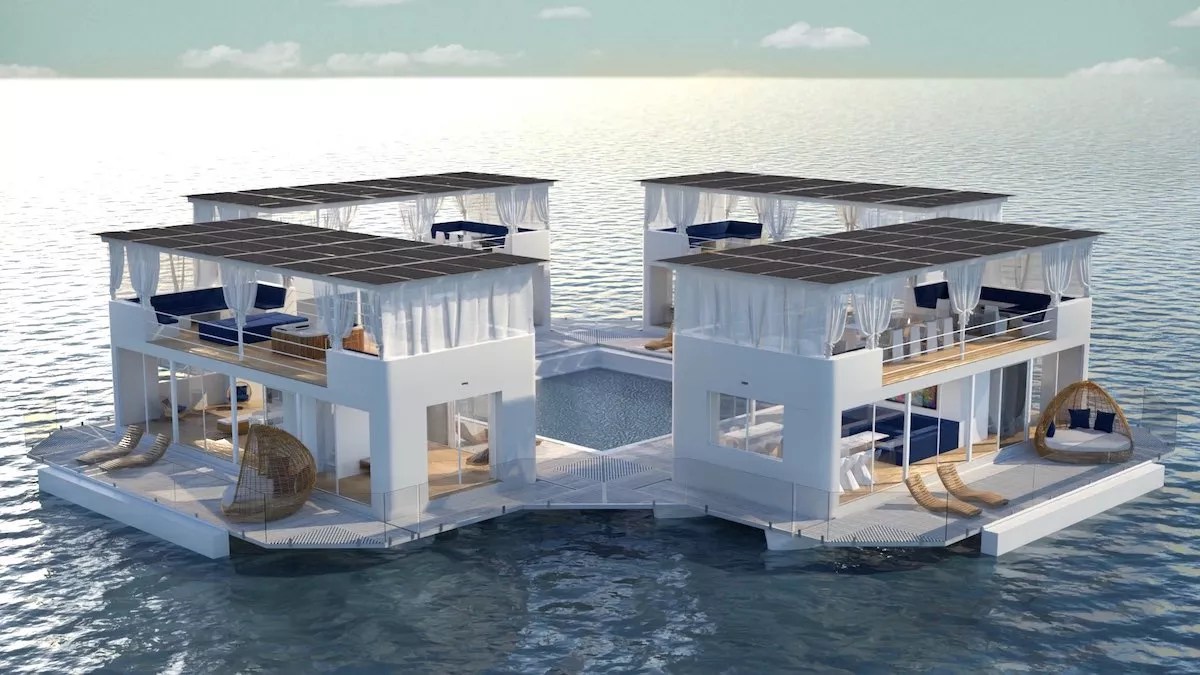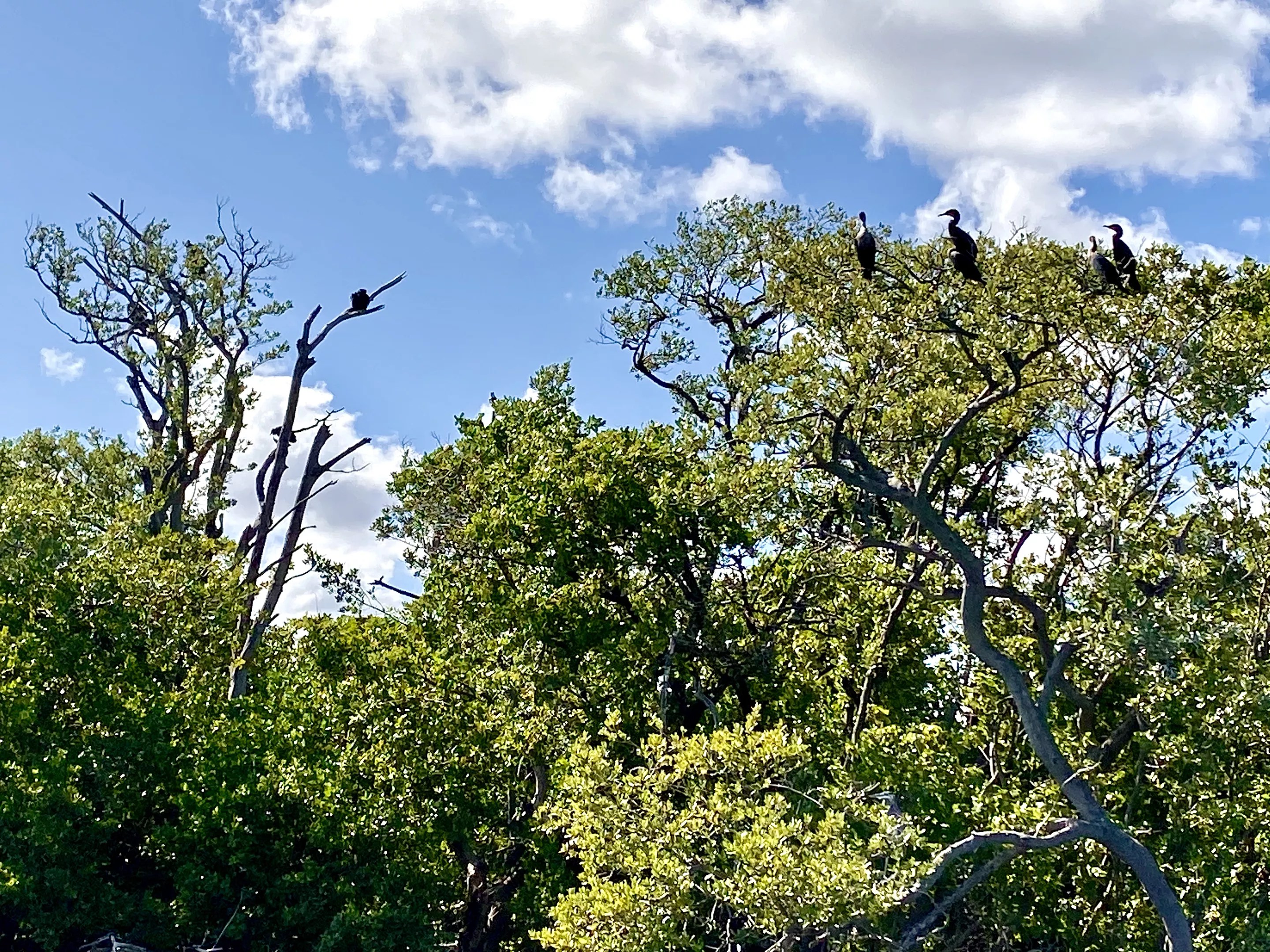
Photo by Terence Cantarella

Audio By Carbonatix
Birds of all sizes, shapes, and sounds have flocked to the island of Bird Key for as long as anyone has been keeping track.
For centuries, the 3.7-acre islet in Biscayne Bay off the coast of Miami’s Upper Eastside has served as a mangrove-lined sanctuary for dozens of native bird species – offering brown pelicans, herons, and double-breasted cormorants shelter from predators and a place to nest. The habitat is one of only a few naturally formed islands in Biscayne Bay and has long been on Miami-Dade County’s list of environmentally endangered lands.
In recent years, the privately owned island has been plagued by washed-up piles of trash and, in 2019, the sudden collapse of its rookery. But local conservationist Christopher Boykin says he and other wildlife researchers hold out hope that Bird Key will someday return to its former state.
Boykin remembers watching the bird colonies dwindle four years ago.
“It hurts my heart,” the executive director of the nonprofit Pelican Harbor Seabird Station tells New Times. “It was very painful when it happened.”
The island may indeed be on the mend – flocks of different species of birds can be seen flying to and from the outcropping when the weather is right – but Boykin fears a new project tailored to a wealthy Miami clientele might chase them away for good.

The exclusive club, made up of four sleek solar-powered yachts bordering a natural pool, plans to host live music and yoga classes to a lucky 360 members.
Image by Arkhaus
Commissioning vessels from the designers behind the $5.5 million houseboat off Miami’s Star Island, a duo of New York entrepreneurs have teamed up for a new venture called Arkhaus, which aims to erect “the world’s first-ever private social club on the water,” right off the shores of Bird Key.
Sam Payrovi and Nathalie Paiva envision a lavish members-only club next to the island, comprising four sleek, solar-powered yachts surrounding a central, natural pool. The venture promises to host live music, serve food, and offer yoga classes to an anticipated membership of 360. Available annual memberships range from $7,500 to $10,000 a year, in addition to a handful of “NFT forever memberships,” one of which reportedly sold for roughly $36,000 worth of Ethereum cryptocurrency.
The company last year advertised a “Party Up Top, Research on the Bottom” campaign, claiming ecological research will be performed aboard the same vessels on which Arkhaus guests revel and imbibe.
“Because of the island’s ideal and scenic location right in the middle of Biscayne Bay, we thought it was the perfect setting for Arkhaus,” Payrovi said in a May 2023 press release. “Our members will be able to enjoy the beautiful Biscayne Bay skyline from an avant-garde, picturesque and sustainable setting, all the while supporting important marine and ecological research that positively contributes to Miami’s vibrant waterways and wildlife.”
An interactive online brochure for the Miami project places the ultramodern, two-story structure on a southern section of Bird Key that Boykin says was a critical nesting place for birds when the island’s rookery was thriving.
“We hope that birds will return to Bird Key, but certainly they would be less likely if there’s a private social club with music and boats,” Boykin says. “Even if they were to never return on their own, it’s just pouring salt on the wound to have that right where we had this amazing biomass of diversity and beauty and wilderness here in Miami.”
The club was initially scheduled to open in December 2022 but the date was pushed back to the following spring and is now slated for sometime in early 2024. Arkhaus intends to expand the concept to California, Paris, Istanbul, and Dubai.
Paiva tells New Times that the company is committed to environmental stewardship.
“Our environmental board was formed to bring together leaders whose missions help to educate and advise on a local level, while aiding Arkhaus in building an eco-hospitality concept that is unmatched in its drive towards zero carbon and more,” Paiva writes in an email. “Ocean regeneration, cleanups of aquatic environments, and decarbonizing marine transport are just a few of the Arkhaus initiatives we are excited to champion beyond the club’s initial Miami launch.”
Sam Van Leer, an environmentalist and founder of the local nonprofit Urban Paradise Guild, is not buying it.
“Nothing that they can offer will offset the damage,” he asserts. “Nothing, period, end of story.”
Describing the potential impacts of Arkhaus’ project as “unacceptable” and noting that the little island is an uninhabited retreat for wildlife, Van Leer says humans need to steer clear.
When he visits the island for research purposes, he typically paddles around it quietly and maintains a distance, he says. A floating high rollers’ club, on the other hand, stands to bring parties, lights, smoke, and a cacophony of noise around a rare sanctuary where Miami wildlife can live unmolested and undisturbed.
“Honestly, I love it when people have fun, but there is a place for everything. And there are places where it shouldn’t happen,” Van Leer says.

Birds sit atop the treeline on Bird Key, a privately owned island in Biscayne Bay, Miami, Florida.
Photo by Terence Cantarella
He adds that not only does the noise from the club threaten to frighten away the remaining birds on Bird Key, but the structure itself could damage the bay bottom, including Johnson’s seagrass, a source of food for manatees and sea turtles.
Arkhaus recently announced it had signed a lease for its Bird Key location and that its vessels are entering production at a shipyard. As a hospitality business, Arkhaus requires a liquor license, entertainment permits, and other licensing from the City of Miami, Miami-Dade County, and the state. But because it will operate over water, Arkhaus’ primary regulator is the U.S. Coast Guard.
The company tells New Times it is currently working with the Coast Guard to obtain regulatory clearance for the project.
Initially held by the wealthy industrialist Charles Deering (of the popular Deering Estate), Bird Key was acquired by real estate investors Edward Easton and Finlay Matheson in 1985 for $36,000. Over the past decade, the property has been transferred between members of the Matheson family, county records show.
Late last year, a county deed showed that the title was transferred from several Matheson family members to Bird Key LLC, a company that lists Finlay Matheson as a manager in state records.
Though the island remained for decades on a list of areas marked for county acquisition under Miami-Dade’s Environmentally Endangered Lands Program, Matheson told the Miami Herald in 2019 that he had never received offers from the county to buy the parcel. If the county had followed through on acquiring the island, conservation measures and more stringent environmental protections would likely have been put in place to protect wildlife.
Van Leer says there are alternative spots where Arkhaus could erect its project and have less of an ecological impact. One such place, he says, would be Haulover Sandbar in North Miami Beach (which he notes already functions as a club on a weekly basis).
As for Arkhaus’ current plans to set up near Bird Key?
“I just think it’s a nonstarter,” Van Leer says.